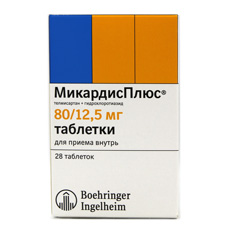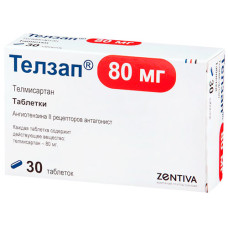
Pharmachologic effect:
AntihypertensivePharmacodynamics:
Telmisartan at a dose of 80 mg completely blocks the hypertensive action of angiotensin II. The onset of the hypotensive effect is noted within 3 hours after the first dose of telmisartan. The effect of the drug persists for 24 hours and remains significant up to 48 hours. A pronounced hypotensive effect usually develops after 4-8 weeks of regular use.
In patients with arterial hypertension, telmisartan reduces systolic and diastolic blood pressure without affecting heart rate.
In the event of abrupt withdrawal of Micardis, blood pressure gradually returns to its original level without the development of a withdrawal syndrome.
Pharmacokinetics:
When taken orally, telmisartan is rapidly absorbed from the gastrointestinal tract. Bioavailability - 50%.
When taken simultaneously with food, the decrease in AUC values ranges from 6% (when used at a dose of 40 mg) to 19% (when used at a dose of 160 mg). After 3 hours after ingestion, the concentration in the blood plasma levels off, regardless of the time of the meal.
Plasma protein binding - more than 99.5%, mainly with albumin and α1-glycoprotein. The average value of the apparent Vd in the equilibrium state is 500 liters.
Telmisartan is metabolized by conjugation with glucuronic acid. Metabolites are pharmacologically inactive.
T1/2 - more than 20 hours. Excreted through the intestines unchanged, excretion by the kidneys - less than 2% of the dose taken. The total plasma clearance is high (900 ml/min) compared to hepatic blood flow (about 1500 ml/min).
There is a difference in concentration between men and women. In women, Cmax and AUC were approximately 3 and 2 times higher, respectively, than in men (without a significant effect on efficacy).
The pharmacokinetics of telmisartan in elderly patients does not differ from the pharmacokinetics in young patients. Dose adjustment is not required.
Dose modification is not required in patients with renal insufficiency, including patients on hemodialysis. Telmisartan is not removed by hemodialysis.
In patients with mild to moderate hepatic impairment (Child-Pugh class A and B), the daily dose of the drug should not exceed 40 mg.
Indications:
-arterial hypertension;
-reduction of cardiovascular morbidity and mortality in patients aged 55 years and older with a high risk of cardiovascular disease.
Contraindications:
- obstructive diseases of the biliary tract;
- severe liver dysfunction (Child-Pugh class C);
- simultaneous use with aliskiren in patients with diabetes mellitus or renal insufficiency (GFR <60 ml / min / 1.73 m2);
- fructose intolerance, glucose/galactose malabsorption syndrome or sucrase/isomaltase deficiency;
- age up to 18 years (efficacy and safety have not been established);
- pregnancy;
- the period of breastfeeding;
- hypersensitivity to the active substance or auxiliary components of the drug.
Use with caution:
bilateral stenosis of the renal arteries or stenosis of the artery of a single kidney;
abnormal liver and / or kidney function;
decrease in BCC due to previous diuretic therapy, restriction of salt intake, diarrhea or vomiting;
hyponatremia;
hyperkalemia;
conditions after kidney transplantation (no experience of use);
chronic heart failure;
stenosis of the aortic and mitral valve;
idiopathic hypertrophic subaortic stenosis;
primary aldosteronism (efficacy and safety not established).
Pregnancy and breast-feeding:
The use of Micardis is contraindicated during pregnancy and during the period of breastfeeding.
Patients planning pregnancy should be given alternative therapy. If treatment with Micardis was carried out in the second trimester of pregnancy, ultrasound of the kidneys and skull bones in the fetus is recommended. Newborns whose mothers took Micardis should be carefully monitored for hypotension.
Side effects:
headache, dizziness, fatigue, insomnia, anxiety, depression, convulsions.
abdominal pain, dyspepsia, nausea, diarrhea, increased activity of hepatic transaminases.
cough, pharyngitis, upper respiratory infections.
decrease in hemoglobin level.
rash; in a single case - angioedema.
peripheral edema, urinary tract infections, increased uric acid levels, hypercreatininemia.
pronounced decrease in blood pressure, palpitations, chest pain.
back pain, myalgia, arthralgia.
hyperkalemia, anemia, hyperuricemia.
flu-like syndrome
Interaction:
Simultaneous use with antihypertensive drugs may increase the antihypertensive effect.
Simultaneous use with potassium-sparing diuretics, heparin, dietary supplements, salt substitutes containing potassium, may cause development of hyperkalemia.
Simultaneous use with lithium preparations, may cause an increase in the concentration of lithium in the blood plasma.
Simultaneous use with digoxin may cause an increase in the concentration of digoxin in the blood plasma.
Dosing and Administration:
Micardis tablets are taken orally with or without food.
With arterial hypertension, the recommended initial dose of Micardis is 40 mg 1 time per day. In cases where the therapeutic effect is not achieved, the dose of the drug can be increased to 80 mg 1 time per day. When deciding whether to increase the dose, it should be taken into account that the maximum antihypertensive effect is usually achieved within 4-8 weeks after the start of treatment.
To reduce cardiovascular morbidity and mortality, the recommended dose is 80 mg 1 time/day. In the initial period of treatment, additional correction of blood pressure may be required.
Overdose:
Symptoms: pronounced decrease in blood pressure, tachycardia, bradycardia.
Treatment: symptomatic therapy. Hemodialysis is ineffective.
Micardis®
in Cyrillic : Микардис
SUBSTANCE
Telmisartan
DOSAGE FORM
tablets




